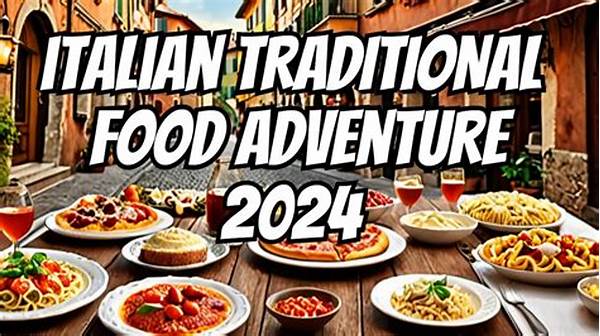When it comes to culinary heritage, few traditions are as rich and enduring as those of Italy. The classic Italian recipes passed down from nonnas (grandmothers) and parents through generations are a testament to the love, pride, and joy that Italian families place in their meals. These recipes are far more than just instructions for whipping up pasta or pizza; they’re narratives of cultural identity, geographic uniqueness, and familial bonds.
Read Now : Exclusive Birthday Party Locations
The Heritage of Classic Italian Recipes
Immersed in vibrant flavors and time-honored techniques, classic Italian recipes passed down through the ages have a magical way of bringing people together. Picture Sunday dinner with ravioli made from scratch, seasoned with stories from the past. Each dish isn’t just about eating—it’s about preserving a legacy, sharing love, and arguing over the right amount of garlic. It’s quirky, heartfelt, and oh-so Italiano! Every Italian dish tells a story, some about those who took a leap and crossed oceans and others about those who stayed and sowed seeds.
By mastering classic Italian recipes passed down like Nonna’s cherished lasagna or Dad’s secret spaghetti sauce, you’re not just cooking; you’re continuing family traditions. Your kitchen becomes a portal to cozy Italian homes, bustling city squares, or tranquil countryside views. Here, the aroma of simmering tomatoes and fresh basil wafting through your home blurs the line between now and then, proving that famiglia (family) is everything.
The Essence of Italian Cooking Traditions
1. Nonna’s Touch: Classic Italian recipes passed down have that ‘nonna touch’ where every sprinkle of salt is guided by sheer instinct rather than a measuring spoon.
2. Rustic Simplicity: Think of hearty soups, just like ‘minestrone’, where each family’s version is a slice of life more than a recipe.
3. From the Heart: It’s all about cooking with love. Pull out your heartstrings and ladle them right into that risotto!
4. Organized Chaos: Italians use a little bit of this and a pinch of that, turning what seems like chaos into the perfect pasta surprise.
5. Gastronomic Storytelling: Classic Italian recipes passed down speak in flavors and aromas, narrating tales over a steaming dish of ossobuco or refreshing limoncello.
The Pulse of Italian Culinary Slang
Classic Italian recipes passed down embody a colorful dialect of the culinary world exclusive to Italian kitchens. Here, any minute becomes ‘un momento’, a worthy pause for sharing laughter and a taste of life. Whether you’re an outsider stepping into an Italian home or a native reminiscing about your roots, they evoke a deep familiarity. It’s no surprise terms like al dente or antipasto find their place in regular dining discussions worldwide.
The Italian culinary language is a fiery dance of flavors and expressions. Saying “prego” might mean you’re welcoming someone or adding a dash more Parmigiano. Classic Italian recipes passed down exude a vibrancy mirrored only by Italy’s zestful community spirit. It’s a tantalizing mix of words and spices, capturing the peaks and bursts of Italy’s diverse culture in every savory bite. These expressions are not just a linguistic tapestry but a living, breathing testament to the heart and soul of Italy.
Reviving Italian Gastronomy
The hues of Italian culinary expressions might feel cryptic, yet they embody the radiant warmth and passion typical of Italian families. Here’s how classic Italian recipes passed down swirl slang into their mix:
1. “Mangia!” is more than just ‘eat’; it’s a celebration of food and life.
2. “Capisco!” acknowledges the silent joy when you master Nonna’s gnocchi.
3. “Che Schifo!” unleashes a playful ‘yuck’ at pineapple on pizza.
4. “Al Forno” reminds us of a warm past hidden within oven-baked delights.
Read Now : Popular Weekend All-you-can-eat Menus
5. “Quando finisci?” is cheekily about when that fresh batch of pasta will arrive.
6. “Basta!” rings out when the table is loaded, signaling satisfaction or restraint.
7. “Bufala” identifies a luxe mozzarella type but also jokes about a “tall tale”.
8. “Allora” is the laid-back pivot in conversation and stirring risotto.
9. “Stringere” brings family closer through shared meals and tighter bonds.
10. “Aspetta!” cries out to pause and savor every rich morsel on your plate.
Crafting Legends With Classic Recipes
The legacy of classic Italian recipes passed down creates culinary legends. Passed from generation to generation, each recipe is an artifact of history, culture, and love. It’s not just the aged balsamic or the homemade pasta; it’s also the stories that accompany these dishes. Imagine a bustling Italian kitchen with nonnas, daughters, and granddaughters laughing and cooking together, sharing techniques that have stuck like glue through wars, celebrations, and simple Sunday dinners.
Today’s homemade pizza or tiramisu continues to weave these stories into the fabric of time, inviting family and friends to gather around once more. Classic Italian recipes passed down are never merely about taste; they’re heartbeats of a shared experience, embodied memories on a dish, waiting to be celebrated, adored, and devoured. Each meal is a ticket to the past, a story waiting to be retold with pride and passion, in the only language Italians truly know: the language of food.
The Soul of Italian Culinary Expression
The soul of classic Italian recipes passed down is in the art of expression—a linguistic celebration interwoven with culinary mastery. Each spicy, saucy phrase reflects Italy’s diverse regions and palates. This distinct narrative allows for a deeper understanding of Italy beyond what eyes see or mouths taste. Words here connect experiences of sweet basil’s fragrance with the rich, comforting taste of homemade lasagna.
This Italian vibrancy is not merely about eating; it’s a cultural immersion. Culinary exchanges here break the mundane barriers of language ambiguities. Instead, they trigger familiarity, drawing soulful connections between people. Every plate becomes a universal text of tradition, unity, and joy. Classic Italian recipes passed down continue this dialogue, offering a slice of Italy, a touch of history, a taste of familia, and a warm reminder of home.
Slang and Stories of the Italian Kitchen
In summary, classic Italian recipes passed down are more than culinary guides. They’re narratives of tradition, rich in the slang and idiomatic expressions that make them distinct. From the colorful language of kitchen chatter to the striking simplicity of the recipes themselves, these elements imbue meals with a vibrancy that’s unmistakably Italian. With every serving, a story unfolds, an invisible thread that ties each generation to the next, bridging the gap between past and future with tastes and aromas that linger in memory.
As we explore these classic recipes, we’re not merely flipping through pages of a cookbook. We’re diving into history, connecting with countless souls who came together over a bowl of pasta or a glass of Chianti. Classic Italian recipes passed down serve not just our stomachs, but our sense of identity, our need for connection, and our appetite for stories that taste of heritage informed by countless generations kneading dough and grinding spices. They’re time capsules of love and culture, ready to inspire at any table around the world.



